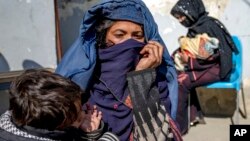United Nations Secretary-General Antonio Guterres began two days of private discussions in Qatar on Monday with special envoys from various countries on how to sustain humanitarian operations in Afghanistan, as the Taliban continue to place restrictions on Afghan women and girls.
The U.N.-convened meeting in Doha, Qatar, is being held behind closed doors. It aims to "reach points of commonality" on issues such as the rights of Afghan women and girls, inclusive governance, countering terrorism, and drug trafficking, said Stephane Dujarric, a spokesperson for the secretary-general.
"The meeting is intended to achieve a common understanding within the international community on how to engage with the Taliban on these issues," Dujarric added.
Envoys from nearly two dozen countries, including the United States, China, Russia, Saudi Arabia, Pakistan, Iran, India, Qatar and Britain, are participating in the discussions.
The Taliban government criticized the organizers for not inviting its representatives to the meeting and depriving it of its "legitimate right" to express its position to the delegates.
"Any meeting without the participation of IEA (Islamic Emirate of Afghanistan) representatives — the main party to the issue — is unproductive and even sometimes counterproductive," said Suhail Shaheen, the Taliban permanent representative-designate to the United Nations.
Shaheen used the official title of the Taliban government, saying "one-sided decisions and intimidating demeanor" cannot help in solving issues.
"How can a decision taken at such meetings be acceptable or implemented while we are not part of the process? It is discriminatory and unjustified," said Shaheen, who is based in Doha and heads the Taliban political office there.
Since returning to power in August 2021, the Taliban leadership has banned Afghan girls from attending schools beyond the sixth grade and women from participating in most public and daily life areas.
They have recently stopped Afghan female employees from working with the U.N. and other aid groups in a country where nearly 29 million people, or two-thirds of the population, rely on humanitarian assistance. Several million Afghans are said to be just a step away from famine-like conditions.
"Reversing all measures that restrict women's rights to work is key to reaching the millions of people in Afghanistan that require humanitarian assistance," Guterres tweeted on Saturday. "Afghans urgently need emergency aid. Women are essential to ensure it’s delivered," he said.
On Thursday, the 15-member U.N. Security Council unanimously condemned and demanded the Taliban swiftly reverse their crackdown on Afghan women's rights.
The Taliban Foreign Ministry rejected the call and described the ban on women working with the U.N. as an "internal social matter of Afghanistan."
Hibatullah Akhundzada, the reclusive Taliban chief, has dismissed international calls for removing curbs on women and girls, saying he will not allow any foreign interference in his Islamic governance.
The Doha meeting has been marred by controversy over whether it would also discuss the recognition of the Taliban government.
The controversy stemmed from U.N. Deputy Secretary-General Amina Mohammed's remarks at a seminar at Princeton University earlier this month, where she suggested the recognition would also be on the agenda.
"We hope we will find those baby steps to put us back on the pathway to recognition … of the Taliban," Mohammed said. Her comments have since forced the U.N. to repeatedly clarify that "recognition is not an issue on the table."
Washington has dismissed as "unacceptable" any talks on the subject at Monday's meeting.
No country has recognized the Taliban government. However, several neighboring and regional countries, including China and Russia, have kept their embassies open in Kabul and allowed the fundamentalist authorities to take charge of Afghan embassies on their respective soils.
Foreign governments have been pressing the de facto authorities to remove bans on women's access to work and education and govern the country through an inclusive government representing all Afghan ethnicities.
The United States and Europe blocked Afghanistan's foreign reserves of more than $9 billion after the Taliban takeover, and they remain frozen. Washington and other Western nations also ended financial assistance to the largely aid-dependent country and imposed banking sector sanctions.
The Taliban blame the sanctions for deepening economic and humanitarian troubles facing Afghanistan.
On Sunday, the U.N. humanitarian chief said they needed $4.6 billion to fund life-saving operations in the country this year.
"At the moment, we are begging governments to give us the money that we need to do that because that program is hugely unfunded,” he said.
Analysts said the Taliban had reneged on their pledges to respect the human rights of all Afghans, including women, making it difficult for the U.N. to conduct humanitarian activities in the war-ravaged country.
"Western donors are stepping away from Afghanistan, and the U.N.'s request for more than $4 billion is no longer heard by them," Torek Farhadi, a former Afghan official, told VOA.







